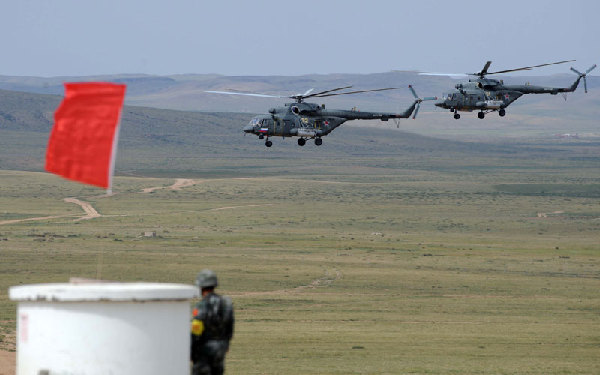Washington's paranoia has a clear purpose

 |
| Mil Mi-8 helicopters were among aircraft taking part in an exercise staged at the Zhurihe training base in the Inner Mongolia Autonomous Region. [Photo/Xinhua] |
Many know that Washington has been suffering from serious dysfunction, as was reflected in the latest Gallup poll in which Americans said the government was the US' No 1 problem, but few realize that the symptoms of paranoia are worse.
On Tuesday, at the Atlantic Council, a think tank in Washington, a group of so-called experts were discussing the implication of the emerging anti-access/area-denial capabilities in the Asia-Pacific region. The views of most countries, from Singapore and Thailand to Vietnam and the Philippines, were presented. Yet not only was there no speaker from China, which was the focal point of the talk, but also none of the panelists mentioned the Chinese perspective.
Instead, the three panelists, two with a Pentagon background and the third having once worked for the Japanese embassy in Washington, described how China with its growing military power poses a threat to the US and every other country in the region. One said China could shoot down satellites, while another asserted that China could use its missiles to attack Japan. They then started to emphasize how every country in the region is scared of China and seeking help from the US.
Sitting 3 meters from the podium, I probably should have been worried about my safety in case one of the panelists ran amok and threw a chair at me. Fortunately, I don't suffer from the same paranoia the panelists exihibited. The only thing I did was to tell them that using their logic, the US, with its advanced weaponry, could attack every country and destroy the planet 10 times, if not 100 times, over.
If the Chinese suffered from the same paranoia, the just-concluded annual session of the National People's Congress, the top legislature, should have raised China's military spending by 50 percent this year, instead of just 10 percent, which is less than the increase in 2014.
Even if China's A2/AD strategy exists, it is defensive in nature, while the US Air Sea Battle, renamed this year as the Joint Concept for Access and Maneuver in the Global Commons (JAM-GC) is offensive and preemptive. However, the panel didn't touch on this.

































